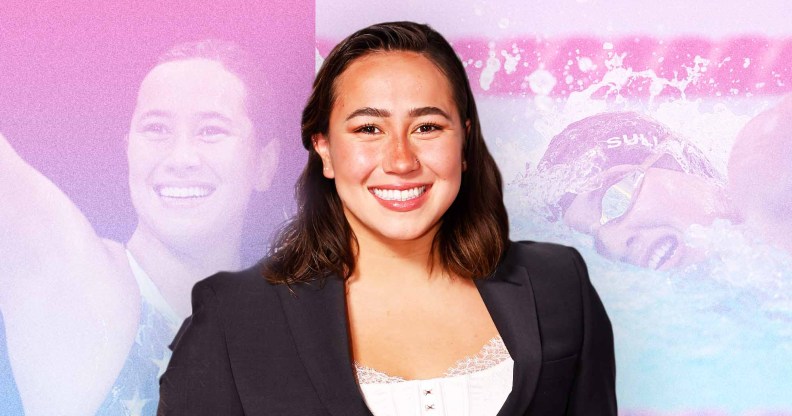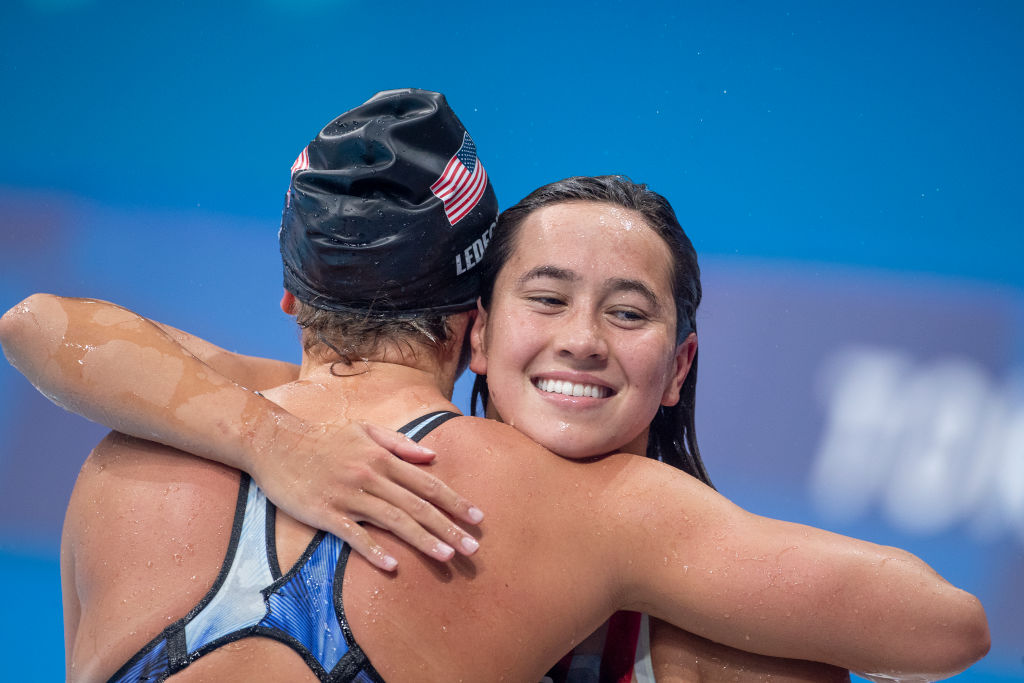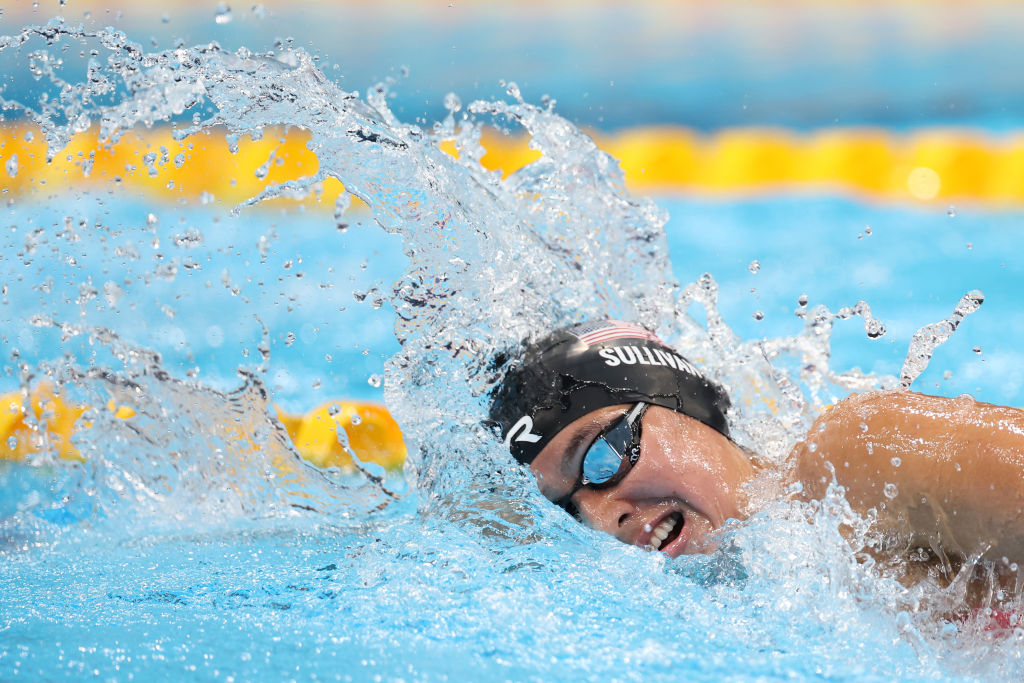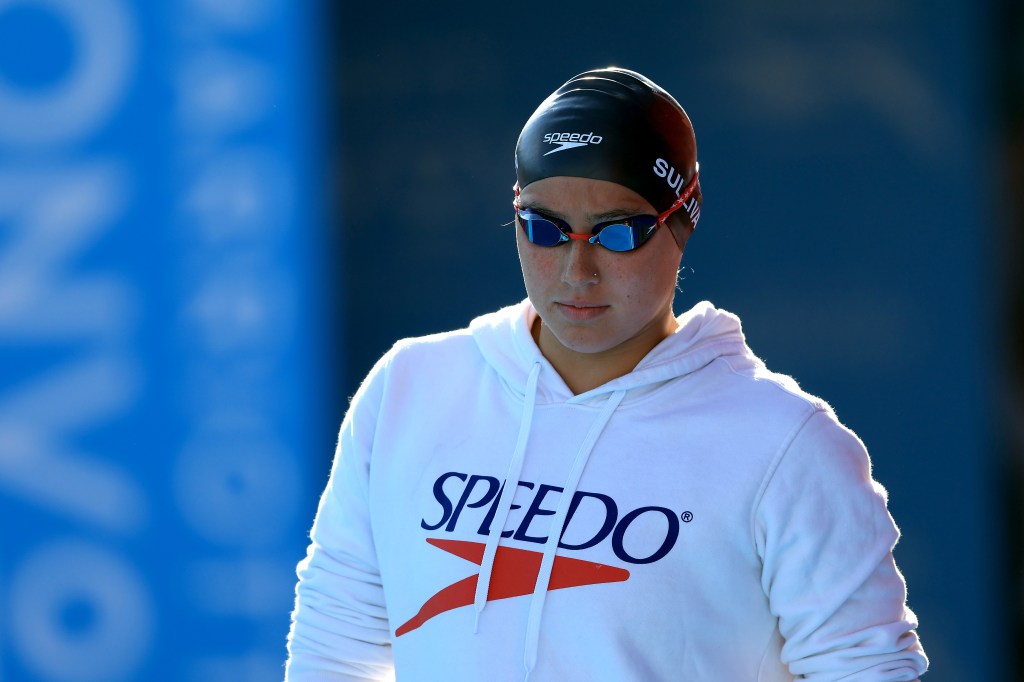Gay Olympian Erica Sullivan on trans athletes, Pride ‘money grabs’ and actual issues in women’s sport

Erica Sullivan is an Olympic medallist and one of the most successful gay women in swimming. (Getty)
Olympic swimmer Erica Sullivan isn’t interested in tired debates about trans women in sport.
The way Sullivan describes it, swimming isn’t just a sport – it’s a culture, a small, insular world where “everyone pretty much knows everyone”. When she won silver in the 1500-metre freestyle swim at the 2020 Tokyo Olympics, she instantly became one of the visible – and successful – active out lesbian athletes in the game.
Fiercely competitive, Sullivan is determined to be the best – but she also wants to make sure sport is a fairer, more equitable space for all queer people and women. That’s why she was so furious when a group of people who had never engaged with swimming in their lives decided it was time to wade in.
In 2022, Sullivan wrote an essay in defence of Lia Thomas, the trans woman who received global backlash for her success in collegiate swimming, explaining how Thomas had been “unfairly targeted”.
“As a woman in sports, I can tell you that I know what the real threats to women’s sports are: sexual abuse and harassment, unequal pay and resources and a lack of women in leadership,” Sullivan wrote for Newsweek. “Transgender girls and women are nowhere on this list.”
At first, Sullivan, grappled with whether or not she should even speak up. She knew how she felt, but she wondered if it was her place as a cisgender woman to defend the trans community. But in the end, as the attacks escalated, she knew she had to do something.
“I just feel like everyone who had been vocal about it weren’t really people who understood swimming. It really wasn’t their place to speak out about something that they didn’t have any knowledge on,” Sullivan tells PinkNews.

“Honestly trans athletes are just such a small group of people and I felt they were getting very overpowered by the wrong side, and so using the place where I got to with my career and being in the queer community, I felt like it was my place as an ally to speak my part.”
Looking back, she’s glad she spoke up – especially considering how fast those who were suddenly so invested in college swimming disappeared again once the furore over Lia Thomas was over.
“Those people who spent so much time invested in the NCAAs of the 2022 year, where were you at NCAAs 2023? There were so many women producing amazing times and they weren’t there to talk about it anymore so they kind of stopped caring. And I’d say that’s probably the most frustrating piece of it all.”

Erica Sullivan: ‘The threat to women in sport is that no one really pays attention’
Erica Sullivan is more interested in focusing on what she describes as the “actual” issues facing female athletes, which start with a lack of funding.
“I just say, if you want to support women in sport go to the events, pay attention, watch women in sport,” Sullivan says.
“I would say that the threat to women in sport is that no one really pays attention to women in sport.”
Things are getting at least somewhat better – as far as Sullivan sees it, female football and basketball players are now better paid and their games are more watched than they once were. But progress isn’t being felt all across the board. In swimming, athletes are still struggling to find a way to make it a financially viable career.

“If you want to be a pro swimmer you either have to have a suit sponsorship or you have to work another job because swimming is already a sport that gets attention every four years, and on top of that when people pay more attention to men than women, you can really struggle with finding a place in the sport.”
Erica Sullivan is one of the few who’ve managed to make swimming a viable career. She’s sponsored by Speedo.
The partnership comes as many brands dial down their support for LGBTQ+ Pride in the face of increasing backlash. Analysis has found that mentions of Pride Month were down this year among big corporations, following high-profile boycotts of brands such as Target and Bud Light over their LGBTQ+ campaigns.
“With corporate Pride a lot of them tend to miss the mark and they use it as a money grab, and they really don’t do good for the queer community,” Sullivan says.
“And so I just wanted that to be a priority with Speedo. They listened to me and they said: ‘Pick a charity, we’ll do it.’”
Speedo donated $40,000 to the Human Rights Campaign (HRC) on Sullivan’s behalf. She chose the charity after meeting the president of the HRC, Kelley Robinson.
“Hearing her speak about the issues she wanted to change or improve upon in America was just so inspiring to me, and her fight for queer rights, and not just who you’re attracted to but also your gender spectrum – it was really important. She seemed really passionate about it and she had an energy that I honestly haven’t seen in a long time,” she explains.

Sullivan knows how important the work of charities like the HRC is because she’s witnessing first hand how much things are regressing for her community. She’s currently living in Texas, which is just one of the states where anti-LGBTQ+ laws have been passed and introduced at a state level in recent years.
Her advice to queer people who are feeling targeted is to “prioritise safety” – but she also wants them to show up at the ballot box.
“I cannot emphasise enough the importance of voting. We’ve got to show up to the ballots and be able to be seen and heard. That’s just not something we can be complacent about and think it’s going to work itself out because it’s not. The people who tend to be conservative and want these laws to pass, they show up at the ballot box every single election day and we have to do the same.”
It’s not the easiest time to be LGBTQ+, but Sullivan doesn’t want queer people to lose hope.
“Try to hold onto the positives. Keep fighting and don’t lose faith in what we’re fighting for. If we stay adamant and keep applying pressure on what change we want to see in the world it’s going to work itself out.”
How did this story make you feel?

